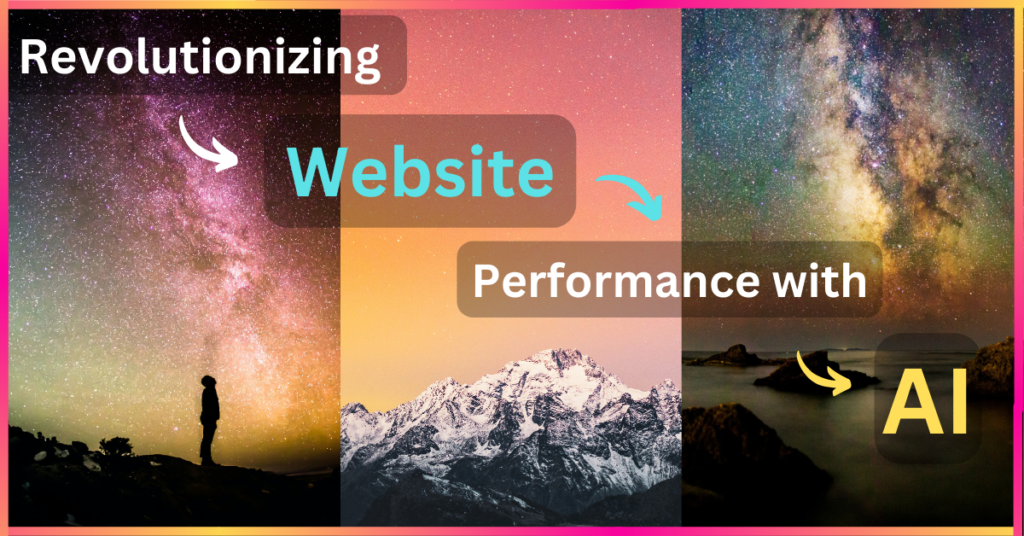I. Introduction
- Definition of AI in digital marketing
- Importance of website performance in digital marketing
- Overview of using AI to optimise website performance
II. Understanding Website Performance Metrics
- Website performance metrics and why they matter
- Types of website performance metrics
- Measuring website performance with Google Analytics
III. How AI Can Help Analyse Website Performance
- Types of AI algorithms used in website performance analysis
- Benefits of using AI for website performance analysis
- Tools and platforms for AI-based website performance analysis
IV. Optimising Website Performance with AI
- Understanding website performance optimisation
- AI-based website optimisation techniques
- Implementing AI-based website optimisation strategies
V. Case Studies: Examples of AI-based Website Optimisation
- Case study 1: Improving website speed with AI
- Case study 2: Enhancing user experience with AI
- Case study 3: Optimising website content with AI
VI. Best Practices for Using AI to Analyse and Optimise Website Performance
- Tips for getting started with AI-based website analysis and optimisation
- Common mistakes to avoid when using AI for website performance optimisation
VII. Conclusion
- Recap of the importance of website performance optimisation in digital marketing
- Final thoughts on the benefits of using AI for website performance analysis and optimisation.
As digital marketing continues to evolve, businesses are increasingly turning to artificial intelligence (AI) to help them analyse and optimise website performance. AI in digital marketing refers to the use of algorithms and machine learning to automate tasks, improve decision-making, and enhance overall marketing effectiveness.
Website performance is a crucial component of digital marketing, as it directly impacts the user experience and ultimately, the success of a business’s online efforts. A slow-loading website or poor navigation can quickly turn off potential customers and harm a company’s bottom line. As a result, businesses are always looking for ways to improve their website performance and stay ahead of the competition.
Overview of using AI to optimiSe website performance:
One approach that has gained popularity in recent years is using AI to optimise website performance. By leveraging machine learning algorithms and data analysis tools, businesses can gain valuable insights into their website’s performance and identify areas for improvement. These insights can help businesses to enhance website speed, user experience, content optimisation, and more, resulting in better engagement, higher conversion rates, and improved customer satisfaction.
We will explore the different ways in which AI can be used to analyse and optimise website performance in digital marketing. From understanding website performance metrics to implementing AI-based website optimisation strategies, we will delve into the benefits and best practices of using AI for website performance analysis and optimisation. By the end of this blog, you will have a clear understanding of how AI can be leveraged to improve your website’s performance and drive business success.
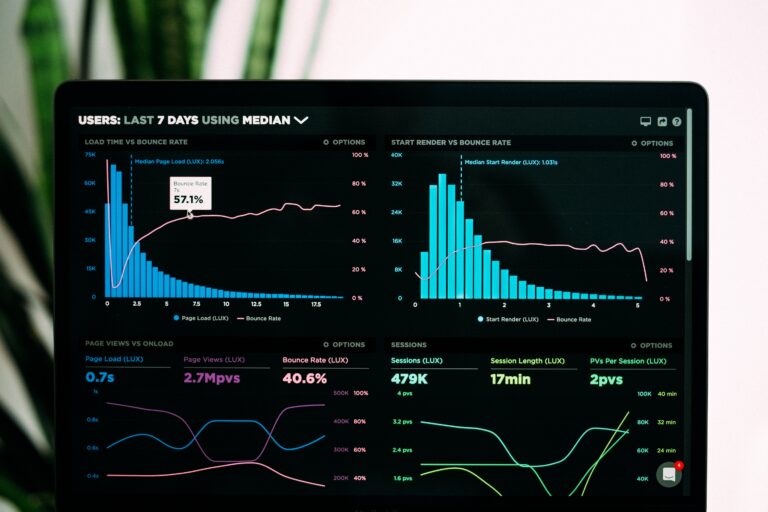
Website performance metrics and why they matter
Website performance metrics are essential for measuring the effectiveness of a website and ensuring it meets its goals. By tracking website performance metrics, businesses can gain insights into their website’s strengths and weaknesses and make data-driven decisions to improve user experience and engagement.
Types of website performance metrics
There are various types of website performance metrics, each with its unique significance. For instance, page speed metrics measure how quickly a website loads and how long it takes to display content. User engagement metrics, on the other hand, measure user behaviour, such as the number of pages viewed, time spent on the website, and bounce rate.
Measuring website performance with Google Analytics
One widely-used tool for measuring website performance metrics is Google Analytics. This platform provides businesses with a wealth of data on their website’s performance, including traffic sources, user behaviour, and conversion rates. With Google Analytics, businesses can track website performance over time and gain insights into how users interact with their website.
Summary
Website performance metrics are crucial for understanding the effectiveness of a website and identifying areas for improvement. By tracking these metrics and using data-driven insights to optimise website performance, businesses can enhance the user experience, drive engagement, and ultimately, achieve their digital marketing goals.
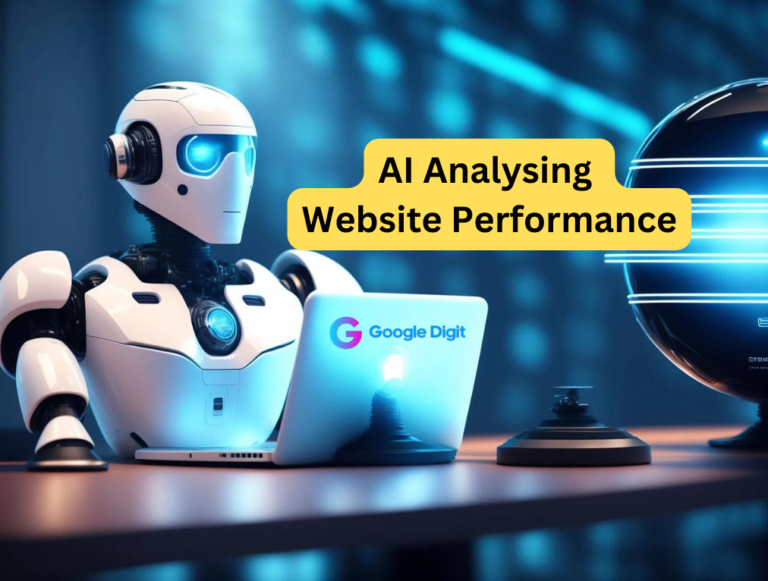
Types of AI algorithms used in website performance analysis
AI algorithms can be used to analyse website performance data and provide valuable insights into how users interact with a website. There are several types of AI algorithms that can be used for website performance analysis, including machine learning algorithms, neural networks, and natural language processing (NLP) algorithms.
Benefits of using AI for website performance analysis
The benefits of using AI for website performance analysis are numerous. For one, AI algorithms can process large volumes of data quickly and accurately, providing businesses with valuable insights into their website’s performance. AI can also help identify patterns and trends in user behaviour that might not be apparent through traditional website analytics tools.
Tools and platforms for AI-based website performance analysis
There are several tools and platforms available for businesses looking to leverage AI for website performance analysis. For example, Google’s PageSpeed Insights and Lighthouse use machine learning algorithms to analyse website performance and provide recommendations for optimisation. Similarly, tools like IBM Watson Analytics and Amazon SageMaker use NLP algorithms to analyse website data and provide insights into user behaviour.
Overall
Using AI for website performance analysis can help businesses gain a competitive edge by providing valuable insights into user behaviour and identifying areas for improvement. By leveraging the power of AI, businesses can optimise website performance, enhance the user experience, and ultimately, achieve their digital marketing goals.
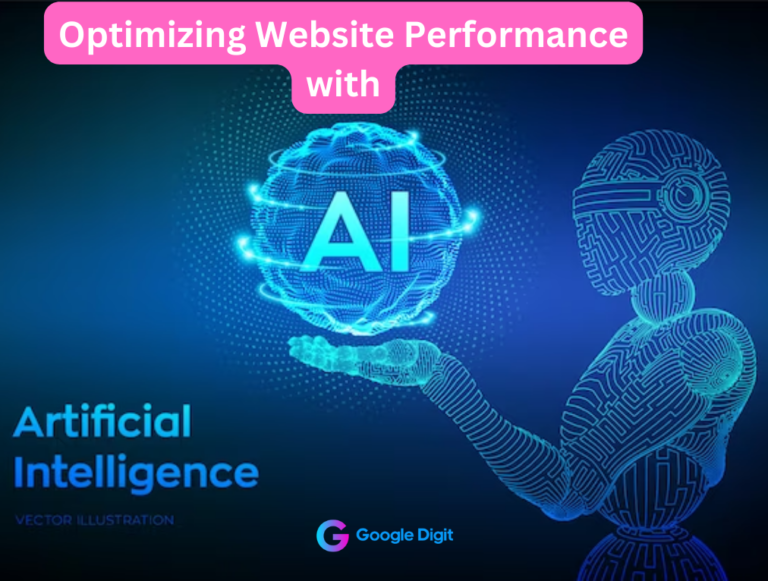
Understanding website performance optimisation
Understanding website performance optimisation is critical for businesses looking to improve the user experience and drive engagement. Website performance optimisation involves various techniques and strategies aimed at enhancing website speed, navigation, content, and user engagement.
AI-based website optimisation techniques
AI can be leveraged to optimise website performance in several ways. For instance, machine learning algorithms can be used to analyse website data and provide insights into which website features and content are most engaging to users. This data can then be used to optimise website content and navigation to enhance the user experience.
Another technique for AI-based website optimisation is personalisation. By leveraging machine learning algorithms, businesses can create personalised website experiences tailored to each user’s preferences and behaviours. This can lead to higher engagement and conversion rates, as users are more likely to engage with content that is relevant to their needs.
Implementing AI-based website optimisation strategies
AI can be leveraged to optimise website performance in several ways. For instance, machine learning algorithms can be used to analyse website data and provide insights into which website features and content are most engaging to users. This data can then be used to optimise website content and navigation to enhance the user experience.
Summary
Using AI for website performance optimisation can lead to a better user experience, increased engagement, and higher conversion rates. By leveraging machine learning algorithms and other AI-based techniques, businesses can optimise website speed, navigation, content, and personalisation to achieve their digital marketing goals.

Case study 1: Improving website speed with AI
One example of using AI for website optimisation is improving website speed. In a case study conducted by Google, an e-commerce website used Google’s PageSpeed Insights tool, which leverages machine learning algorithms to identify areas for website speed improvement. The tool provided recommendations for optimising images, reducing server response time, and minimising render-blocking resources, resulting in a 15% improvement in website speed.
Case study 2: Enhancing user experience with AI
Another example of using AI for website optimisation is enhancing user experience. In a case study conducted by IBM, an online retailer used IBM Watson’s machine learning tools to personalise the website experience for each user. By analysing user behaviour and preferences, the retailer was able to provide personalised product recommendations, resulting in a 30% increase in conversion rates.
Case study 3: Optimising website content with AI
A third example of using AI for website optimisation is optimising website content. In a case study conducted by Adobe, a travel website used Adobe Sensei, an AI-powered content optimisation tool, to personalise website content for each user. By analysing user behaviour and preferences, the tool provided personalised travel recommendations, resulting in a 20% increase in revenue.
Case study 1: Improving website speed with AI
One example of using AI for website optimisation is improving website speed. In a case study conducted by Google, an e-commerce website used Google’s PageSpeed Insights tool, which leverages machine learning algorithms to identify areas for website speed improvement. The tool provided recommendations for optimising images, reducing server response time, and minimising render-blocking resources, resulting in a 15% improvement in website speed.
Summary
These case studies demonstrate the power of using AI for website optimisation. By leveraging machine learning algorithms and other AI-based techniques, businesses can improve website speed, enhance user experience, and optimise website content, leading to higher engagement and conversion rates.
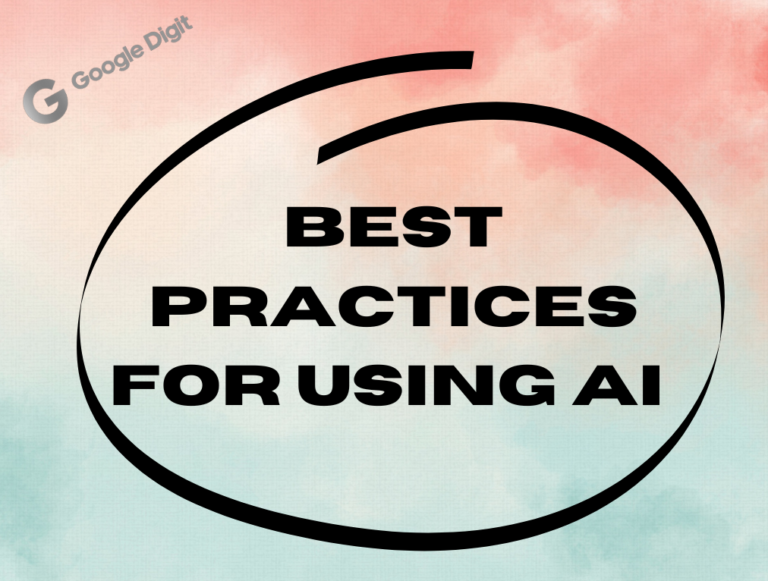
Tips for getting started with AI-based website analysis and optimisation
When getting started with AI-based website analysis and optimisation, it’s essential to define clear goals and objectives for your digital marketing strategy. Identify the key performance indicators (KPIs) you want to measure and improve, such as website speed, user engagement, or conversion rates. Another best practice is to start small and focus on one or two areas for optimisation. For example, you might begin by using AI to analyse website data and provide insights into user behaviour and preferences. This data can then be used to optimise website content or navigation to enhance the user experience.
Common mistakes to avoid when using AI for website performance optimisation
One common mistake to avoid when using AI for website performance optimisation is relying solely on AI to make decisions. While AI can provide valuable insights and recommendations, it’s essential to use human judgment and expertise to interpret the data and make informed decisions. Another mistake is not regularly monitoring and evaluating the effectiveness of AI-based website optimisation strategies. It’s crucial to track KPIs and adjust optimisation strategies as needed to ensure they are delivering the desired results.
Summary
By following best practices such as defining clear goals and objectives, starting small, and combining AI with human judgment, businesses can effectively leverage AI for website performance analysis and optimisation. Additionally, by avoiding common mistakes such as relying solely on AI or failing to monitor effectiveness, businesses can ensure they are maximising the benefits of AI-based website optimisation.
Recap of the importance of website performance optimisation in digital marketing
In today’s digital age, a business’s website is often the first point of contact with potential customers. As such, website performance is critical in digital marketing. Slow loading times, poor user experience, or confusing navigation can all deter potential customers from engaging with a business’s website and, ultimately, making a purchase. Final thoughts on the benefits of using AI for website performance analysis and optimisation. Fortunately, advances in AI technology have made it easier for businesses to analyse and optimise their website’s performance. By using AI algorithms and tools, businesses can gain valuable insights into user behaviour and preferences, optimise website content and navigation, and ultimately improve the user experience and drive conversions.
Summary
AI-based website analysis and optimisation can help businesses stay competitive in today’s digital landscape by improving website performance and delivering a better user experience. By leveraging the power of AI, businesses can gain a competitive edge and achieve their digital marketing goals.

